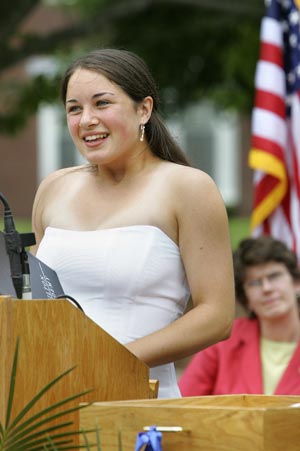Graduation 2005
Graduation at Milton includes years of traditions and favorite rituals – formal and informal. For instance, an early morning parade from house to house picks seniors up at each stop (to the cheers of housemates) and then marches from east campus back to Straus Library. The longstanding practice of electing the student speakers has assured seniors that they will, at their last Milton gathering, hear a voice of their choosing. That alone differentiates a Milton graduation from most others.
Speech by Bertha Coombs ’80
Thank you so much. It’s quite a trip to be back here. It’s a 25-year roundtrip for me. I graduated over there — from what used to be the girls school.
This morning I was in Straus and ran into some new young alumni — fellow alumni soon to be — and they were bemoaning the fact that it’s so hot. You need to drink some water to stay hydrated but at the same time we are going to be sitting out here for a while so there’s this tension that you might need to go to the bathroom. So I suggested that the speech might be a good time to cut out. And I’ve got to tell you, my new friend Sarah, as I was listening to Tanner and Lisa I was thinking, holy cow, I’ve got to follow those guys. Maybe I better cut out now before it’s too late, but I didn’t move fast enough so here goes.
It’s kind of funny when I was at Milton — it’s funny to hear what Mr. McCloskey had to say about me because, quite frankly, when I was at Milton I was the loneliest girl here. I was not just the loneliest girl across Centre Street over there, I was the loneliest girl across Massachusetts, across New England, east of the Mississippi because of this little speech called “Forever a Stranger.” It was this little chestnut of a speech that one little, lonely girl would get on the speech team. It was written by a woman named Diane Oaks and in it she asked her mother about what she should write a speech about, and her mother tells her, “Tell them about loneliness, tell them how people need each other.”
I gave those lines more times than I can remember. The highlight of the speech, the real drama, the get-you line, was when the young woman quotes Thomas Wolfe from “Look Homeward Angel” when she says, “Which of us is not forever a stranger and alone.” I kind of make fun of that because it’s maudlin, but I did pretty well. My sophomore year, my first year here at Milton, I placed fourth at the Catholic Nationals. Lo and behold. It was just kind of exciting.
But part of the reason I think I did so well with that speech was because I was kind of a stranger to myself here at Milton. I was an immigrant kid and like so many of us, you know, I felt this pressure to succeed. As much as you might feel the pressure to succeed being the third generation coming to Milton Academy, with all the expectations, it’s hard being the first person coming here, the first person in your family trying to head to college. And so I really felt this pressure to be perfect all the time and really succeed.
And sometimes it was hard because it was something I couldn’t exactly tell my parents because I wanted to validate the sacrifice they made to come here. And there were times they just didn’t really understand. Like my making the choice not to take the Red Line over to Cambridge when it came time to go to college to actually go away. To my mom, in fact, it was as if I had committed a crime. This friend of hers asked, “Well, we know Bertha has been applying to schools. Is she going to go to Harvard next year?” And my mother said, “No, Bertha no going to Harvard next year. She’s going to “Jale.” That being “Jale Juniversity.”
I mean I know she’s proud. She’s here today and very proud how hard I worked to get to “Jale” and the good grades that got me there, but when I think back it was really one of the worst grades I got here that proved to be the most important. I had – I don’t remember the class. It might have been English, it might have been history. I had a paper and I got a C plus. Now we all know it’s an honorable grade. It doesn’t keep you from being president or, as I learned this Week, the junior senator from Massachusetts. It’s fine, right, but to me it was the scarlet letter of my shame, the beginning of the slippery slope to a life of failure.
I was just a little dramatic and a little bit Uptight, let’s just say, when I was here. The lucky accident was that I got that C plus, and I carried that scarlet letter with me on my way to a speech team practice. And I sat with my speech team couch Dale [Deletis], and he saw I was upset and asked me what was wrong. And I, who always tried to be perfect, in that moment for some reason trusting him, decided to be real and told him how I felt like I was going to fail, I just couldn’t succeed. I shared a real part of myself and my vulnerability and that was the beginning of a really important friendship that is important to me to today. When I wrestled with what to tell you about, that’s who I called and that’s who has helped me. Not the only person — but one of the people.
It would be another happy accident at “Jale” when I was a senior not quite knowing what I was going to do. Because I figured out, you know, I had a few more C pluses by then and thought, well, I don’t know if I’m going to go to law school after all, and I saw a flyer for the Barenek Fellowship and I applied and was interviewed. And at the interview I was really tired. It had been a really long process, two days, and these people keep hammering me with questions. And at the end, the last question they asked me was the one that I thought was just so dumb to ask somebody who is 21. The news director asked me, he said, “Well, where do you see yourself 10 years from now?”
You know, I’m sure there was a more politic answer, and I’m sure I should have anticipated that question, but I was really honest with him. I didn’t tell him, “Hey, I think this is a really stupid question,” but I did say, “You know, I don’t know. I think 10 years from now I may very well be selling peanuts at a stand in Boston Common. All I know is that if that’s what I’m doing, I will just try to do it really well and be the best peanut seller I can be. That’s all I can imagine.”
Well, my peanut career has been on hold for a while now, and actually 10 years from then I found myself in New York reporting. And a lot of times I found I’d talk to people, you interview politicians, these days I interview more people in finance and economics, and it’s so often I find that it’s just so hard to get them to really talk to you. They’re cautious and politicians and, these days economists because of a lot of liability issues, analysts and CEOs of companies, they have to be very cautious so sometimes when you talk to them you know there’s a real person there, but it’s a little bit like Velveeta. It’s made with real cheeses, but it’s so processed you just cannot recognize it to save your life.
And the people that I find myself drawn to and the people who I find really enjoying interviewing and talking to you are the ones who can get beyond all the regulations and all the caution and sometimes cut through and be themselves. Rudy Giuliani was one of them. Didn’t always agree, generally don’t agree with what he has to say, but, man, he really hits home. I remember one of the first press conferences that I covered he was really steamed by a judge who had given a light sentence to a person who had assaulted a police officer. So he came up and he gave the prepared statement that I’m sure his staff helped him craft, but you could tell that he was kind of upset. And so he gave a statement and his staff was kind of trying to pull him off. And, you know, we’re reporters. We like to sort of nail people a little bit so people would ask him questions to get him to sort of be real, and he would take the bait.
And he had somewhere to go, his staff kept pulling him off, but he kept coming back to that podium to make his point, and I admired him that day because I thought, “He has passion, he really cares about what he’s talking about,” and it reached me, and I’m sure it reached a lot of other New Yorkers because he was real.
At some point he lost his way. He kept that comb-over way too long, and in a more serious way I think he sort of lost his sense of self when he cheated on his wife and announced their divorce on television. If you should ever be a very public person and are getting a divorce from someone, that’s not the way to do it. His stock fell very, very low, and as he was leaving office people really didn’t have that great of a feeling about him. And then that horrible morning, that beautiful, sunny, summer morning, September 11th, and these planes from nowhere brought us tragedy.
And that day, this man who had faced down cancer, was so real. He was vulnerable. I don’t know if you remember. It was very moving to many of us because we were all feeling so confused and all feeling like we didn’t know what was going on. And here was this person saying, “Yes, this is how we feel, but we will persevere.” That sense of being true cut across, and that guy whose stock had fallen so low was the hero that day.
So as it turns out I guess I’m like everyone else daring you to be true, and I don’t want to sell you a bill of goods because, you know, being true isn’t going to protect us if the skies open up right now, it’s not going to protect you from not getting the job that you might really want or being fired, as I have been, from a job you really like, or it won’t protect you either in those wee small hours in the morning when your true love proves not to be so true.
But if you don’t think of yourself as being that stranger alone, and you truly aren’t, and you can say you are not because you have reached out to people who are your friends and who really love you, your parents, some classmate here, it might be a little easier. It does make it a little easier. When I was getting a little nervous about giving this speech, I reached out to friends. And I, like that girl in that original speech, asked them “What shall I tell them about?” and two to one they all said, “You know, the bottom line is really getting to know people and making those connections with people.”
So as you are sitting here now wondering what you are going to be doing with your life and this pressure that we all put on you to be great achievers, I want to be the first one to say, “Don’t be a stranger.” Take someone from here with you. You will take your best friends, I’m sure. I still talk to my best friends, but remember somebody else in the class. Reach out to someone else or one of your teachers or someone who you met in the cafeteria who kept you from that lethal peanut butter.
One of my classmates, Sean McVity, is so good at this. He over the years — and it’s been 25 — would see me now and then on TV and would write me, drop me a note (that was before Al Gore invented the Internet) or he’d find a way to call, and always find a way. We are not real close and he’s not my best friend, but every now and then, I will hear from Sean, and it’s kind of nice. And I got up this morning and I checked my email, and guess who wrote me an e-mail today? Sean McVity. He’s in Warsaw, Poland, on business. And he said, “You know, I couldn’t make it back for the speech and I know you are going to be there, I think you’ll be great.”
And I tell you it was — I almost cried this morning. It was just so great. So your friends will be there when times are bad, and they’ll be there to celebrate with you when you have your children, when you marry, if you marry, some of us don’t, and when you have all those great successes, and they will be there when things go really wrong. But I just want to challenge you to try to be there for someone else just because on a nice summer day in June when you know they are going to be having a pretty fun day, be there then too, drop them a line, give them a call so that when you’re there some morning and you’ve had some big failure in your life and you think back to Thomas Wolfe and you think, “Yeah, which of us is not forever a stranger and alone?” you can raise your hand and say, “I’m not.”
Congratulations. Have a wonderful time. I am hopeful that these [diplomas] will not smear if it rains. And even if they do, it doesn’t matter because you have done some pretty great stuff to get here, and I’m sure you will have some pretty good times ahead. Congratulations.
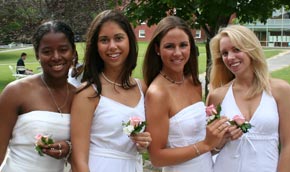
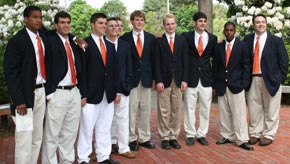

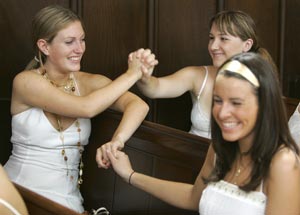
Graduation Speakers
Bertha Coombs ’80

Dr. Robin Robertson, Head of School
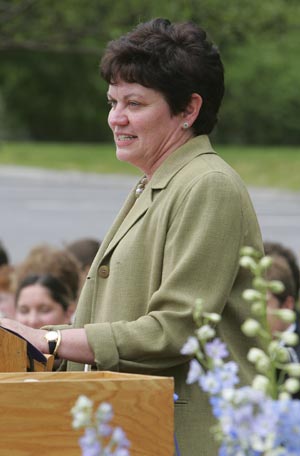
Tanner Harvey ’05
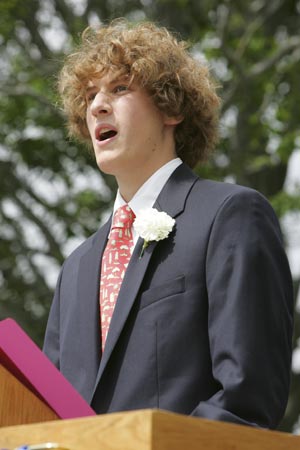
Lisa Campbell ’05
